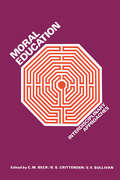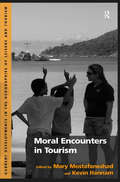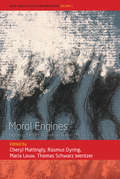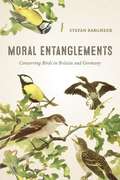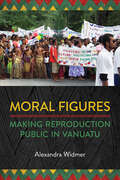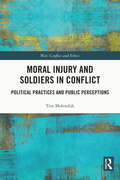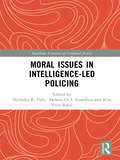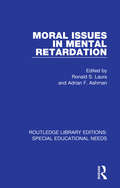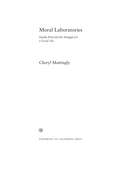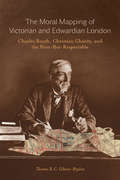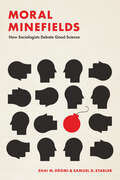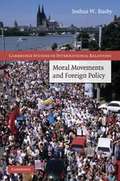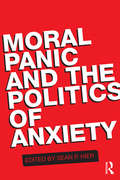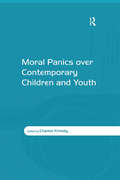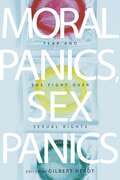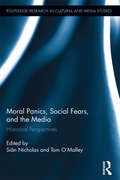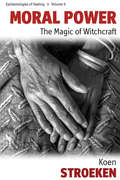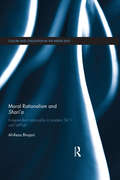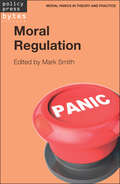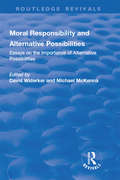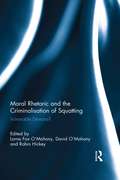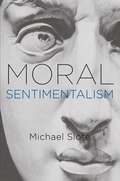- Table View
- List View
Moral Education
by Edmund Sullivan Clive M. Beck Brian S. CrittendenThis volume, based on an interdisciplinary conference of psychologists, sociologists, philosophers, and social scientists, explores a topic of vital importance today---moral education. The book is organized around four questions: the nature and scope of moral education, the problem of ethical pluralism, psychological considerations in a program of moral education, and the social structure of the school as it relates to moral education. This volume will interest philosophers and social scientists concerned with human behaviour and values. It will be of special interest to those engaged in educational research, to curriculum planners, and teachers.
Moral Encounters in Tourism (Current Developments In The Geographies Of Leisure And Tourism Ser.)
by Kevin Hannam Mary MostafanezhadThis first full length treatment of the role of morality in tourism examines how the tourism encounter is also fundamentally a moral encounter. Drawing upon interdisciplinary perspectives, leading and new authors in the field address topics that range from volunteer tourism to fertility tourism to reveal new insights into the ways tourism encounters are implicated in, and contribute to, broader moral reconfigurations in Western and non-Western contexts. Illustrating the role of power and power relations in tourism encounters within different political, economic, environmental and cultural contexts, the authors in this anthology analyse, theoretically and empirically, the implications of the privileging of some moralities at the expense of others. Key themes include the moral consumption of tourism experiences, embodiment in tourism encounters, environmental moralities as well as methodological aspects of morality in tourism research. Crossing disciplinary and chronological boundaries, Moral Encounters in Tourism provides a much-anticipated overview of this new interdisciplinary terrain and offers possible routes for new research on the intersection of morality and tourism studies.
Moral Engines: Exploring the Ethical Drives in Human Life (WYSE Series in Social Anthropology #5)
by Cheryl Mattingly Rasmus Dyring Maria Louw Thomas Schwarz WentzerIn the past fifteen years, there has been a virtual explosion of anthropological literature arguing that morality should be considered central to human practice. Out of this explosion new and invigorating conversations have emerged between anthropologists and philosophers. Moral Engines: Exploring the Ethical Drives in Human Life includes essays from some of the foremost voices in the anthropology of morality, offering unique interdisciplinary conversations between anthropologists and philosophers about the moral engines of ethical life, addressing the question: What propels humans to act in light of ethical ideals?
Moral Entanglements: Conserving Birds in Britain and Germany
by Stefan BargheerAt the center of Stefan Bargheer’s account of bird watching, field ornithology, and nature conservation in Britain and Germany stands the question of how values change over time and how individuals develop moral commitments. Using life history data derived from written narratives and oral histories, Moral Entanglements follows the development of conservation from the point in time at which the greatest declines in bird life took place to the current efforts in large-scale biodiversity conservation and environmental policy within the European Union. While often depicted as the outcome of an environmental revolution that has taken place since the 1960s, Bargheer demonstrates to the contrary that the relevant practices and institutions that shape contemporary conservation have evolved gradually since the early nineteenth century. Moral Entanglements further shows that the practices and institutions in which bird conservation is entangled differ between the two countries. In Britain, birds derived their meaning in the context of the game of bird watching as a leisure activity. Here birds are now, as then, the most popular and best protected taxonomic group of wildlife due to their particularly suitable status as toys in a collecting game, turning nature into a playground. In Germany, by contrast, birds were initially part of the world of work. They were protected as useful economic tools, rendering services of ecological pest control in a system of agricultural production modeled after the factory shop floor. Based on this extensive analysis, Bargheer formulates a sociology of morality informed by a pragmatist theory of value.
Moral Figures: Making Reproduction Public in Vanuatu (Anthropological Horizons)
by Alexandra WidmerIn the early twentieth century, people in the southwestern Pacific nation of Vanuatu experienced rapid population decline, while in the early twenty-first century, they experienced rapid population growth. From colonial governance to postcolonial sovereignty, Moral Figures shows that despite attempts to govern population size and birth, reproduction in Vanuatu continues to exceed bureaucratic economization through Ni-Vanuatu insistence on Indigenous relationalities. Through Alexandra Widmer’s examination of how reproduction is made public, she demonstrates how population sciences have a naturalized focus on women’s fertility and privileged issues of wage labour over women’s land access, as well as broader social relations of reproduction. Widmer draws on oral histories with retired village midwives and massage healers on the changes to care for pregnancy and birth, as well as ethnographic research in a village outside the capital of Port Vila. Locating the Pacific Islands in global histories of demographic science and the medicalization of birth, the book presents archival material in a way that emphasizes bureaucratic practices in how colonial documents attempted to render Indigenous relationalities of reproduction governable. While demographic imaginaries and biomedical practices increasingly frame fertility control as an investment in the reproductive health of individual bodies, the Ni-Vanuatu worlds presented in Moral Figures show that relationships between people, land, knowledge, kin, and care make reproduction a distributed and assisted process.
Moral Injury and Soldiers in Conflict: Political Practices and Public Perceptions (War, Conflict and Ethics)
by Tine MolendijkThis book advances an interdisciplinary understanding of moral injury by analyzing the stories of military veterans of combat and peace missions. In the past decade, the concept of moral injury has emerged to address the potential moral impact of deployment. This book contributes to an interdisciplinary conceptualization of moral injury while, at the same time, critically evaluating the concept’s premises and implications. It paints an urgent and compassionate picture of the moral impact of soldiers’ deployment experience and the role of political practices and public perceptions in moral injury. It does so by drawing on the experiences of close to a hundred Dutch veterans deployed to Bosnia (Srebrenica) and Afghanistan, and analyzing their stories from the perspectives of psychology, philosophy, theology and social sciences. Ultimately, this book advances the understanding of moral, political and societal dimensions of moral injury and contributes to practical efforts aimed at its prevention. This book will be of much interest to students of ethics and war, cultural anthropology, conflict studies and international relations.
Moral Issues in Intelligence-led Policing (Routledge Frontiers of Criminal Justice)
by Helene Oppen Gundhus Kira Vrist Rønn Nick FyfeThe core baseline of Intelligence-led Policing is the aim of increasing efficiency and quality of police work, with a focus on crime analysis and intelligence methods as tools for informed and objective decisions both when conducting targeted, specialized operations and when setting strategic priorities. This book critically addresses the proliferation of intelligence logics within policing from a wide array of scholarly perspectives. It considers questions such as: How are precautionary logics becoming increasingly central in the dominant policing strategies? What kind of challenges will this move entail? What does the criminalization of preparatory acts mean for previous distinctions between crime prevention and crime detection? What are the predominant rationales behind the proactive use of covert cohesive measures in order to prevent attacks on national security? How are new technological measures, increased private partnerships and international cooperation challenging the core nature of police services as the main providers of public safety and security? This book offers new insights by exploring dilemmas, legal issues and questions raised by the use of new policing methods and the blurred and confrontational lines that can be observed between prevention, intelligence and investigation in police work.
Moral Issues in Mental Retardation (Routledge Library Editions: Special Educational Needs #34)
by Adrian F. Ashman Ronald S. LauraFirst published in 1985. Despite the vast number of books available on mental handicap, there had been little published about moral, philosophical or ethical issues. Yet such issues must be faced and indeed answered, either explicitly or implicitly, before any system of education or care for mentally handicapped people can be put into practice. This book reviews a number of issues in this field. Key topics addressed include: respect for retarded people; the notion of equal rights; terminating the lives of severely handicapped infants; and genetic engineering. With the current emphasis on recognising the rights and needs of the handicapped as individuals, this book should represent an important review and be of interest to all concerned with mentally handicapped people.
Moral Laboratories
by Cheryl MattinglyMoral Laboratories is an engaging ethnography and a groundbreaking foray into the anthropology of morality. It takes us on a journey into the lives of African American families caring for children with serious chronic medical conditions, and it foregrounds the uncertainty that affects their struggles for a good life. Challenging depictions of moral transformation as possible only in moments of breakdown or in radical breaches from the ordinary, it offers a compelling portrait of the transformative powers embedded in day-to-day existence. From soccer fields to dinner tables, the everyday emerges as a moral laboratory for reshaping moral life. Cheryl Mattingly offers vivid and heart-wrenching stories to elaborate a first-person ethical framework, forcefully showing the limits of third-person renderings of morality.
Moral Mapping of Victorian and Edwardian London: Charles Booth, Christian Charity, and the Poor-but-Respectable
by Thomas R.C. Gibson-BrydonCharles Booth's seventeen-volume series, The Life and Labour of the People in London (1886-1903), is a staple of late Victorian social history and a monumental work of scholarship. Despite these facts, historians have paid little attention to its section on religious influences. Thomas Gibson-Brydon's The Moral Mapping of Victorian and Edwardian London seeks to remedy this neglect. Combing through the interviews Booth and his researchers conducted with 1,800 churchmen and women, Gibson-Brydon not only brings to life a cast of characters - from "Jesusist" vicars to Peckham Rye preachers to women drinkers - but also uncovers a city-wide audit of charitable giving and philanthropic practices. Discussing the philosophy of Booth, the genesis of his Religious Influences Series, and the agents and recipients of London charity, this study is a frank testimony on British moral segregation at the turn of the century. In critiquing the idea of working-class solidarity and community-building traditionally portrayed by many leading social and labour historians, Gibson-Brydon displays a meaner, bleaker reality in London's teeming neighbourhoods. Demonstrating the wealth of untapped information that can be gleaned from Booth's archives, The Moral Mapping of Victorian and Edwardian London raises new questions about working-class communities, cultures, urbanization, and religion at the height of the British Empire.
Moral Mapping of Victorian and Edwardian London: Charles Booth, Christian Charity, and the Poor-but-Respectable
by Thomas R.C. Gibson-BrydonCharles Booth’s seventeen-volume series, The Life and Labour of the People in London (1886–1903), is a staple of late Victorian social history and a monumental work of scholarship. Despite these facts, historians have paid little attention to its section on religious influences. Thomas Gibson-Brydon’s The Moral Mapping of Victorian and Edwardian London seeks to remedy this neglect. Combing through the interviews Booth and his researchers conducted with 1,800 churchmen and women, Gibson-Brydon not only brings to life a cast of characters – from “Jesusist” vicars to Peckham Rye preachers to women drinkers – but also uncovers a city-wide audit of charitable giving and philanthropic practices. Discussing the philosophy of Booth, the genesis of his Religious Influences Series, and the agents and recipients of London charity, this study is a frank testimony on British moral segregation at the turn of the century. In critiquing the idea of working-class solidarity and community-building traditionally portrayed by many leading social and labour historians, Gibson-Brydon displays a meaner, bleaker reality in London’s teeming neighbourhoods. Demonstrating the wealth of untapped information that can be gleaned from Booth’s archives, The Moral Mapping of Victorian and Edwardian London raises new questions about working-class communities, cultures, urbanization, and religion at the height of the British Empire.
Moral Minefields: How Sociologists Debate Good Science
by Shai M. Dromi Samuel D. StablerAn analysis of the effects of moral debates on sociological research. Few academic disciplines are as contentious as sociology. Sociologists routinely turn on their peers with fierce criticisms not only of their empirical rigor and theoretical clarity but of their character as well. Yet despite the controversy, scholars manage to engage in thorny debates without being censured. How? In Moral Minefields, Shai M. Dromi and Samuel D. Stabler consider five recent controversial topics in sociology—race and genetics, secularization theory, methodological nationalism, the culture of poverty, and parenting practices—to reveal how moral debates affect the field. Sociologists, they show, tend to respond to moral criticism of scholarly work in one of three ways. While some accept and endorse the criticism, others work out new ways to address these topics that can transcend the criticism, while still others build on the debates to form new, more morally acceptable research. Moral Minefields addresses one of the most prominent questions in contemporary sociological theory: how can sociology contribute to the development of a virtuous society? Rather than suggesting that sociologists adopt a clear paradigm that can guide their research toward neatly defined moral aims, Dromi and Stabler argue that sociologists already largely possess and employ the repertoires to address questions of moral virtue in their research. The conversation thus is moved away from attempts to theorize the moral goods sociologists should support and toward questions about how sociologists manage the plurality of moral positions that present themselves in their studies. Moral diversity within sociology, they show, fosters disciplinary progress.
Moral Movements and Foreign Policy
by Joshua W. BusbyWhy do advocacy campaigns succeed in some cases but fail in others? What conditions motivate states to accept commitments championed by principled advocacy movements? Joshua Busby sheds light on these core questions through an investigation of four cases - developing country debt relief, climate change, AIDS, and the International Criminal Court - in the G-7 advanced industrialized countries (Canada, France, Germany, Italy, Japan, the United Kingdom, and the United States). Drawing on hundreds of interviews with policy practitioners, he employs qualitative, comparative case study methods, including process-tracing and typologies, and develops a framing/gatekeepers argument, emphasizing the ways in which advocacy campaigns use rhetoric to tap into the main cultural currents in the countries where they operate. Busby argues that when values and costs potentially pull in opposing directions, values will win if domestic gatekeepers who are able to block policy change believe that the values at stake are sufficiently important.
Moral Panic and the Politics of Anxiety
by Sean P. HierMoral Panic and the Politics of Anxiety is a collection of original essays written by some of the world’s leading social scientists. It seeks to provide unique insight into the importance of moral panic as a routine feature of everyday life, whilst also developing an integrated framework for moral panic research by widening the scope of scholarship in the area. Many of the key twenty-first century contributions to moral panic theory have moved beyond the parameters of the sociology of deviance to consider the importance of moral panic for identity formation, national security, industrial risk, and character formation. Reflecting this growth, the book brings together recognized moral panic researchers with prominent scholars in moral regulation, social problems, cultural fear, and health risks, allowing for a more careful and critical discussion around the cultural and political significance of moral panic to emerge. This book will prove valuable reading for both undergraduate and postgraduate students on courses such as politics and the media, regulatory policy, the body and identity, theory and political sociology, and sociology of culture.
Moral Panics over Contemporary Children and Youth
by Charles KrinskyThe concept of moral panic has received considerable scholarly attention, but as yet little attention has been accorded to panics over children and youth. This is the first book to examine this important and controversial social issue by employing a rigorous intellectual framework to explore the cultural construction of youth, through the dissemination of moral panics. It is accessible in manner and makes use of the latest contemporary research by addressing some of the pressing recent concerns relating to children and youth, including cyber-related panics, child abuse and pornography, education and crime. A truly international collection, this volume features new global research focusing on the United Kingdom, Australia, Canada, South Africa, and France as well as the United States. Genuinely multidisciplinary in approach, it will appeal to researchers and students across the social sciences and humanities - from sociology and social theory, to media, education, anthropology, criminology, geography and history.
Moral Panics, Sex Panics: Fear and the Fight over Sexual Rights (Intersections #8)
by Gilbert HerdtFinalist for 2010 LGBT Anthology Award from the Lambda Literary AwardsUnwed teen mothers, abortion, masturbation, pornography, gay marriage, sex trafficking, homosexuality, and HIV are just a few in a long line of issues that have erupted into panics. These sexual panics spark moral crusades and campaigns, defining and shaping how we think about sexual and reproductive rights. The essays in Moral Panics, Sex Panics focus on case studies ranging from sex education to AIDS to race and the "down low," to illustrate how sexuality is at the heart of many political controversies. The contributors also reveal how moral and sexual panics have become a mainstay of certain kinds of conservative efforts to win elections and gain power in moral, social, and political arenas. Moral Panics, Sex Panics provides new and important insights into the role that key moral panics have played in social processes, arguing forcefully against the political abuse of sex panics and for the need to defend full sexual and reproductive rights.Contributors: Cathy J. Cohen, Diane DiMauro, Gary W. Dowsett, Janice M. Irvine, Carole Joffe, and Saskia Eleonora Wieringa.
Moral Panics, Social Fears, and the Media: Historical Perspectives (Routledge Research in Cultural and Media Studies)
by Siân Nicholas Tom O’MalleyThe media have always played a central role in organising the way ideas flow through societies. But what happens when those ideas are disruptive to normal social relations? Bringing together work by scholars in history, media and cultural studies and sociology, this collection explores this role in more depth and with more attention paid to the complexities behind conventional analyses. Attention is paid to morality and regulation; empire and film; the role of women; authoritarianism; wartime and fears of treachery; and fears of cultural contamination. The book begins with essays that contextualise the theoretical and historiographical issues of the relationship between social fears, moral panics and the media. The second section provides case studies which illustrate the ways in which the media has participated in, or been seen as the source of, the creation of threats to society. Finally, the third section then shows how historical research calls into question simple assumptions about the relationship between the media and social disruption.
Moral Power
by Koen StroekenNeither power nor morality but both. Moral power is what Sukuma farmers in Tanzania in times of crisis attribute to an unknown figure they call their witch. A universal process is involved, as much bodily as social, which obstructs the patient's recovery. Healers turn the table on the witch through rituals showing that the community and the ancestral spirits side with the victim. In contrast to biomedicine, their magic and divination introduce moral values that assess the state of the system and that remove the obstacles to what is taken as key: self-healing. The implied 'sensory shifts' and therapeutic effectiveness have largely eluded the literature on witchcraft. This book shows how to comprehend culture other than through the prism of identity politics. It offers a framework to comprehend the rise of witch killings and human sacrifice, just as ritual initiation disappears.
Moral Rationalism and Shari'a: Independent rationality in modern Shi'i usul al-Fiqh (Culture and Civilization in the Middle East)
by Ali-Reza BhojaniMoral Rationalism and Sharī'a is the first attempt at outlining the scope for a theological reading of Sharī'a, based on a critical examination of why 'Adliyya theological ethics have not significantly impacted Shī'ī readings of Sharī'a. Within Shī'ī works of Sharī 'a legal theory (usūl al-fiqh) there is a theoretical space for reason as an independent source of normativity alongside the Qur’ān and the Prophetic tradition. The position holds that humans are capable of understanding moral values independently of revelation. Describing themselves as 'Adliyya (literally the people of Justice), this allows the Shī 'a, who describe themselves as 'Adiliyya (literally, the People of Justice), to attribute a substantive rational conception of justice to God, both in terms of His actions and His regulative instructions. Despite the Shī'ī adoption of this moral rationalism, independent judgments of rational morality play little or no role in the actual inference of Sharī 'a norms within mainstream contemporary Shī'ī thought. Through a close examination of the notion of independent rationality as a source in modern Shī'ī usūl al-fiqh, the obstacles preventing this moral rationalism from impacting the understanding of Sharī 'a are shown to be purely epistemic. In line with the ‘emic’ (insider) approach adopted, these epistemic obstacles are revisited identifying the scope for allowing a reading of Sharī'a that is consistent with the fundamental moral rationalism of Shī'ī thought. It is argued that judgments of rational morality, even when not definitively certain, cannot be ignored in the face of the apparent meaning of texts that are themselves also not certain. An 'Adliyya reading of Sharī'a demands that the strength of independent rational evidence be reconciled against the strength of any other apparently conflicting evidence, such that independent judgments of rational morality act as a condition for the validity of precepts attributed to a just and moral God.
Moral Regulation (Moral Panics in Theory and Practice)
by Mark SmithCommentators have long debated ‘the moral’ in ideas about moral panic, moral regulation and moral discourse. This byte teases out some of the fundamental moral questions that continue to perplex us, about life and death, good and evil, and sex and the body. With an appraisal of the work of one of the chief architects of moral panic ideas, Jock Young, it asks whether these ideas may help or hinder our understanding of these complex issues.
Moral Responsibility and Alternative Possibilities: Essays on the Importance of Alternative Possibilities
by David Widerker and Michael McKennaThis book was published in 2003. This book explores an important issue within the free will debate: the relation between free will and moral responsibility. In his seminal article "Alternate Possibilities and Moral Responsibility", Harry Frankfurt launched a vigorous attack on the standard conception of that relation, questioning the claim that a person is morally responsible for what she has done only if she could have done otherwise. Since then, Frankfurt's thesis has been at the center of philosophical discussions on free will and moral responsibility. "Moral Responsibility and Alternative Possibilities", edited by David Widerker and Michael McKenna, draws together the most recent work on Frankfurt's thesis by leading theorists in the area of free will and responsibility. As the majority of the essays appear here for the first time, "Moral Responsibility and Alternative Possibilities" offers the newest developments in this important debate.
Moral Rhetoric and the Criminalisation of Squatting: Vulnerable Demons?
by Lorna Fox O'Mahony David O'Mahony Robin HickeyThis collection of critical essays considers the criminalisation of squatting from a range of different theoretical, policy and practice perspectives. While the practice of squatting has long been criminalised in some jurisdictions, the last few years have witnessed the emergence of a newly constituted political concern with unlawful occupation of land. With initiatives to address the ‘threat’ of squatting sweeping across Europe, the offence of squatting in a residential building was created in England in 2012. This development, which has attracted a large measure of media attention, has been widely regarded as a controversial policy departure, with many commentators, Parliamentarians, and professional organisations arguing that its support is premised on misunderstandings of the current law and a precarious evidence-base concerning the nature and prevalence of ‘squatting’. Moral Rhetoric and the Criminalisation of Squatting explores the significance of measures to criminalise squatting for squatters, owners and communities. The book also interrogates wider themes that draw on political philosophy, social policy, criminal justice and the nature of ownership, to consider how the assimilation of squatting to a contemporary punitive turn is shaping the political, social, legal and moral landscapes of property, housing and crime.
Moral Sentimentalism
by Michael SloteThere has recently been a good deal of interest in moral sentimentalism, but most of that interest has been exclusively either in metaethical questions about the meaning of moral terms or in normative issues about benevolence and/or caring and their place in morality. In Moral SentimentalismMichael Slote attempts to deal with both sorts of issues and to do so, primarily, in terms of the notion or phenomenon of empathy. Hume sought to do something like this over two centuries ago, though he didn't have the term "empathy" and used "sympathy" instead; and in effect Slote is seeking togive moral sentimentalism a "second wind" in and for contemporary circumstances. By relying systematically on empathy in its account of normative morality and in what it has to say about the meaning of moral vocabulary, Moral Sentimentalism offers a unified overall ethical picture that can then betested against ethical rationalism. Rationalism has recently dominated the scene in ethics, but by showing how sentimentalism can make coherent and intuitive sense of such preferred rationalist notions as autonomy, respect, and justice--and by showing how a sentimentalism based in empathy can dealwith ethically significant aspects of the moral life that rationalism tends to ignore or skimp on--Slote hopes a wider and more active debate between rationalism and sentimentalism can be set in motion. There are signs that sentimentalist modes of thought are gaining new footholds on the way ethicsis done, and this new book is very hopeful about these possibilities.
Moral Status and Human Life
by James G. DwyerAre children of equal, lesser, or perhaps even greater moral importance than adults? This work of applied moral philosophy develops a comprehensive account of how adults as moral agents ascribe moral status to beings - ourselves and others - and on the basis of that account identifies multiple criteria for having moral status. It argues that proper application of those criteria should lead us to treat children as of greater moral importance than adults. This conclusion presents a basis for critiquing existing social practices, many of which implicitly presuppose that children occupy an inferior status, and for suggesting how government policy, law, and social life might be different if it reflected an assumption that children are actually of superior status.
